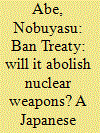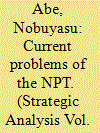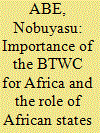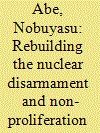| Srl | Item |
| 1 |
ID:
161340


|
|
|
|
|
| Summary/Abstract |
In so far as the nuclear-weapons possessors do not accept the Ban Treaty, practically it will not reduce nuclear weapons nor abolish them as a matter of law. However, if the treaty is accepted by an overwhelming majority of states, it will significantly strengthen the norm against the nuclear weapons. A norm binds everybody irrespective of legal acceptance of a treaty. Thus, it exposes any violator to the risk of international punishment. The Ban Treaty will help bring the movement towards nuclear abolition forward and reduce incentives to own nuclear weapons. The international humanitarian law that was the main basis for the Ban Treaty needs to be upheld firmly. The set of norms under international humanitarian law will serve to limit the justifiable cases where nuclear weapons can ever be used. The Non-Proliferation Treaty and the efforts to prevent nuclear proliferation must be sustained even after the Ban Treaty comes into force.
|
|
|
|
|
|
|
|
|
|
|
|
|
|
|
|
| 2 |
ID:
094496


|
|
|
|
|
| Publication |
2010.
|
| Summary/Abstract |
With the 'world without nuclear weapons' speech by President Obama and the other moves, indications are good for the next Nuclear Non-Proliferation Treaty (NPT) Review Conference. Progress has to be made on the Comprehensive Test Ban Treaty (CTBT), the proposed fissile materials cut-off treaty (FMCT), Negative Security Assurance (NSA), and reducing the role of nuclear weapons. On the non-proliferation side, the Additional Protocol must be made a standard, the International Atomic Energy Agency (IAEA) strengthened, and NPT withdrawal acted on decisively. To avoid the threat of nuclear terrorism, a series of measures has to be applied with perseverance. The only realistic way to address the Middle East question is to proceed in parallel on regional peace and the region free of weapons of mass destruction (WMD).
|
|
|
|
|
|
|
|
|
|
|
|
|
|
|
|
| 3 |
ID:
061998


|
|
|
| 4 |
ID:
089491


|
|
|
|
|
| Publication |
2009.
|
| Summary/Abstract |
The US-India deal on civil nuclear cooperation, in spite of the Indian non-proliferation commitment, has potential adverse impacts on global non-proliferation undermining the basic bargain behind the NPT. In order to overcome such adverse impacts the author proposes to move towards a "universal nuclear disarmament" under which every nuclear weapon holder will be asked to make contributions towards nuclear disarmament. The US, for example, will be asked to ratify CTBT, negotiate a successor to the START I Treaty and engage in strategic dialogues with Russia and China.
The author proposes to apply a proportionate reduction of nuclear warheads weighted according to the size of each arsenal. This way, while the US and Russia will be asked to drastically reduce their arsenals, the other holders will also be asked to start reducing their warheads even in a symbolic manner of by just a few bombs each.
|
|
|
|
|
|
|
|
|
|
|
|
|
|
|
|